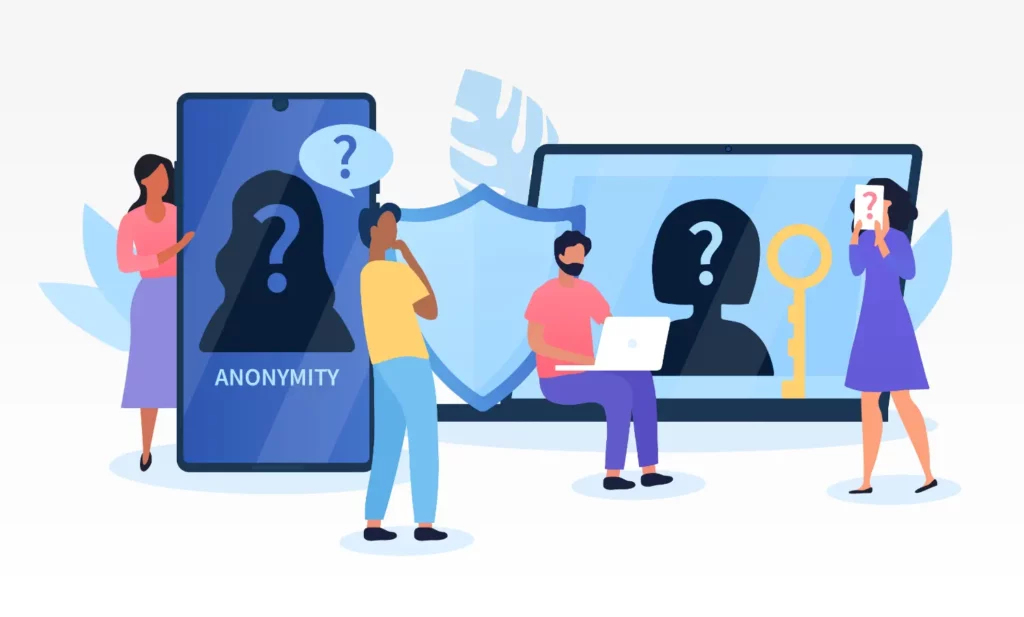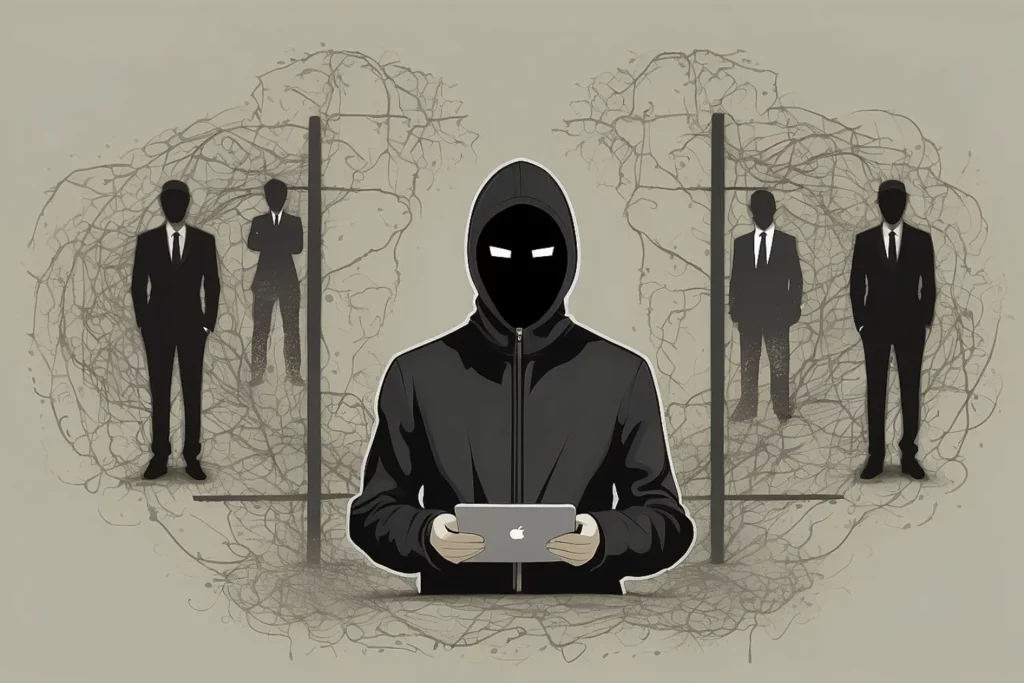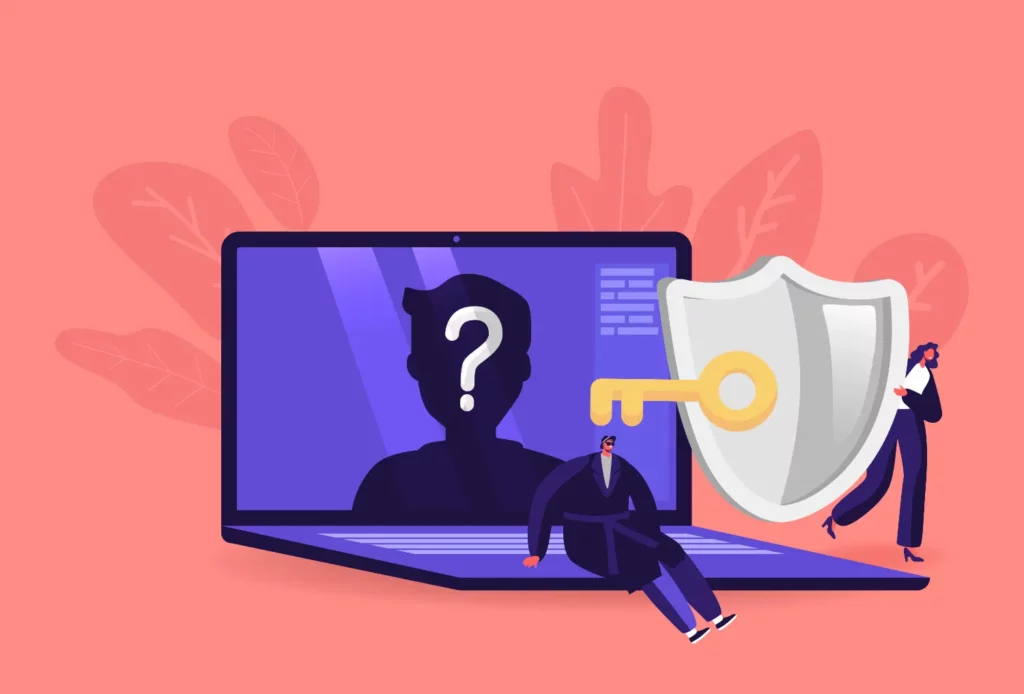
In today’s digital world, hiding your tracks online feels like a nearly impossible mission. Surprisingly, 37% of internet users believe complete online anonymity can be achieved. Our blog post will guide you through the methods and tools that help protect your identity online, despite the odds stacked against us.
Stay safe as we unveil secrets to shield your digital self!
Key Takeaways
- Online anonymity involves concealing your identity to protect personal information and maintain privacy when using the internet. It’s crucial for a range of positive use cases, like protecting vulnerable individuals from harassment or enabling activists to share sensitive data safely.
- There are several risks associated with online anonymity, such as privacy concerns that may lead to cyberbullying and criminal activities, security threats from hackers and malware, plus ethical issues around misuse of anonymous communication for harmful behavior.
- Maintaining online anonymity faces challenges like technical limitations in privacy tools, legal barriers due to differing laws on data retention and jurisdiction conflicts, as well as cost implications for premium security services required for thorough protection.
- Strategies for achieving stronger online anonymity include the use of VPNs to hide IP addresses and encrypt data; secure browsers; updating software regularly; employing encryption methods in emails and messages; leveraging anonymising networks like Tor; plus being cautious about sharing personal details on social media or public forums.
- While seeking online anonymity is important, it must be balanced with responsible conduct. First Amendment rights support freedom of expression but do not exempt users from accountability for their actions. Ethical practices should guide behavior even when acting under an assumed identity or anonymously.
Understanding Anonymity and Identity Shielding
Anonymity and identity shielding online refer to the ability to protect one’s personal information and maintain privacy while using the internet. This is often used to prevent tracking of online activities, safeguard against cyberbullying, and uphold the right to online privacy.
Definition and Purpose
Online anonymity allows users to hide their identity while engaging with the internet, protecting personal information from unwanted exposure. This veil of secrecy is crucial for safeguarding one’s digital identity and maintaining online privacy.
It empowers individuals to communicate without revealing who they are, offering protection against cyberbullying and online harassment.
The purpose of being anonymous on the web extends beyond safety; it also ensures freedom of expression especially in environments where censorship prevails. Users can search, share, and discuss sensitive topics without fear of repercussion or judgement.
For some, this means avoiding tracking from companies concerned more with targeted advertising than user privacy. Despite its complexity and challenges, many see hiding their online identity as a vital part of securing internet security and personal data protection.
Positive Use Cases

After understanding the definition and purpose of online anonymity, it’s essential to explore the positive use cases that highlight its benefits. Here are some examples:
- Protecting vulnerable individuals from harassment and abuse, allowing them to freely engage in online activities without fear of retribution.
- Empowering whistleblowers and activists to share valuable information while maintaining their safety and privacy, leading to increased transparency and accountability.
- Facilitating open and honest discussions on sensitive topics, encouraging individuals to express their opinions without the fear of judgement or repercussions.
- Fostering creativity and innovation by providing a safe space for individuals to experiment with new ideas and projects without the pressure of public scrutiny.
- Enabling individuals to seek support and guidance on personal issues or sensitive subjects anonymously, promoting mental health awareness and community support.
- Preserving cultural diversity by allowing individuals from marginalised communities to share their experiences and perspectives without facing discrimination or prejudice.
- Enhancing political participation by enabling citizens in restrictive environments to voice their opinions without fear of persecution or censorship.
- Safeguarding individuals’ personal information from exploitation by third parties, ensuring greater control over their online identity and digital footprint.
- Promoting freedom of expression by protecting individuals’ rights to communicate openly and honestly without concerns about potential consequences.
- Encouraging inclusive online spaces where diverse voices can be heard, fostering a sense of belonging and acceptance within virtual communities.
Risks of Online Anonymity
Online anonymity comes with its fair share of risks, including privacy concerns, security threats, and ethical considerations that individuals need to navigate. These risks can impact personal safety and online conduct, making it crucial to understand the potential consequences of maintaining anonymity on the internet.
Privacy Concerns
Privacy concerns arise with online anonymity as it can enable individuals to engage in illegal or harmful activities without being held accountable. Online anonymity can make it easier for cyberbullies and trolls to target their victims without fear of consequences, leading to harassment and emotional harm.
Moreover, the ability to conceal one’s true identity online poses a risk of personal data misuse, potentially exposing individuals to identity theft or fraud. These privacy concerns highlight the importance of finding a balance between protecting personal information and advocating for responsible online behavior.
Moving forward – Understanding Risks of Online Anonymity
Security Risks
When considering online anonymity, it’s crucial to acknowledge the security risks involved. Cyber anonymity can expose individuals to potential threats such as hacking, identity theft, and malware attacks.
With personal information at stake, understanding these risks is paramount in safeguarding oneself and one’s family from online harm.
Online pseudonymity and cyber anonymity are not without their dangers. The rise of digital crimes targeting unsuspecting internet users highlights the need for stringent security measures.

Ethical Considerations
Addressing the ethical considerations surrounding online anonymity is essential for promoting responsible and respectful behaviour in digital spaces. With the ability to communicate anonymously, individuals must be mindful of using this privilege responsibly and refrain from engaging in abusive or harmful conduct.
Online anonymity should not be exploited to harass, bully, or spread misinformation, but rather utilised conscientiously to protect privacy and express opinions without fear of repercussions.
It is crucial for internet users to understand that ethical standards apply regardless of whether their identity is known or concealed.
Challenges to Maintaining Anonymity
Achieving and maintaining online anonymity can be challenging due to technical limitations, legal barriers, and cost constraints. These obstacles can make it difficult for individuals to protect their identity and personal information while using the internet.
Technical Limitations
Maintaining anonymity online comes with a set of technical challenges that can impact individuals’ ability to shield their identity effectively. Here are some of the main technical limitations to consider:
- Limited effectiveness of privacy tools: Many privacy tools may not provide comprehensive protection, leaving gaps in shielding personal information from tracking.
- Vulnerabilities in encryption methods: Encryption methods, while effective, can still be susceptible to vulnerabilities and breaches, potentially compromising the security of an individual’s identity.
- Anonymising network constraints: While anonymising networks offer some level of concealment, they may not always guarantee complete anonymity due to potential leaks or weaknesses in the network’s architecture.
- Inherent risks of anonymous browsing: Even with anonymous browsing features, there is no foolproof method to completely evade tracking or keep personal information entirely hidden.
Legal Challenges
Legal challenges related to anonymity online can be complex and impactful. They involve navigating a web of regulations, laws, and jurisdictional issues that can pose significant barriers to maintaining anonymity. Some key legal challenges include:
- Jurisdictional conflicts: When operating online, individuals may encounter conflicting laws across different jurisdictions, making it difficult to ensure consistent protection of their anonymity.
- Data retention laws: Some countries have data retention laws that require internet service providers to store user data for a certain period, which can compromise the anonymity of users.
- Law enforcement access: Authorities may have the power to demand access to personal information from online platforms, potentially undermining individuals’ efforts to maintain anonymity.
- Anti-anonymity legislation: There are instances where governments introduce or consider laws that aim to restrict or eliminate online anonymity altogether, posing significant obstacles for individuals who rely on it for privacy and security.
- International treaties and agreements: Multinational agreements and treaties can impact the ability of individuals to protect their identity online by imposing restrictions on data sharing and cross-border data flow.
- Litigation risks: Engaging in legal actions to protect one’s anonymity can be costly and time-consuming, deterring individuals from pursuing legal remedies when their anonymity is compromised.
- Lack of uniform standards: The absence of universal standards for protecting online anonymity further complicates the legal landscape, leading to varying levels of protection across different platforms and services.

Cost Barriers
Moving on from legal challenges, let’s address the cost barriers to achieving online anonymity. One of the main obstacles in maintaining anonymity online is the expense involved in using privacy tools and encryption methods.
For instance, high-quality virtual private networks (VPNs) or other anonymising services often come with a subscription fee, making them inaccessible for some individuals who may not have the financial means to invest in these technologies.
Additionally, implementing robust security measures to protect personal information can also incur costs. Encryption software and secure communication platforms require ongoing updates and maintenance which can be expensive for many users.
Strategies for Achieving Anonymity
Utilise privacy tools, encryption methods, and anonymising networks to protect your online identity and personal information. Read on to discover how you can maintain anonymity while navigating the challenges involved.
Use of Privacy Tools

Maintaining online anonymity is vital for privacy and security. Utilising privacy tools is essential to achieve this. Here are some effective ways to use privacy tools:
- Utilise reputable virtual private network (VPN) services that conceal your IP address and encrypt your internet traffic, safeguarding your online activities from prying eyes.
- Employ secure and privacy-focused web browsers like Tor or Brave, which offer features such as ad-blocking, script blocking, and protection against tracking.
- Implement browser extensions like uBlock Origin, Privacy Badger, or HTTPS Everywhere to block intrusive ads, prevent tracking cookies, and ensure encrypted website connections.
- Utilise password managers to generate and store complex passwords for different accounts, reducing the risk of unauthorised access to sensitive information.
- Install reputable antivirus software with privacy protection features to defend against malware, phishing attempts, and other cyber threats that compromise personal data.
- Use secure messaging apps with end-to-end encryption like Signal or Telegram for private communications that shield your conversations from surveillance.
- Employ anonymity – focused search engines such as DuckDuckGo or Startpage that do not track your searches or store your personal information.
- Enable two – factor authentication (2FA) on all your online accounts to add an extra layer of security and reduce the risk of unauthorised access even if login credentials are compromised.
- Regularly update your operating system and applications to patch security vulnerabilities and strengthen the overall defence of your digital devices against potential exploits.
- Consider utilising anonymous payment methods like cryptocurrency or prepaid cards for online transactions to minimise the exposure of sensitive financial details.
Encryption Methods
- Utilise end-to-end encryption in messaging apps to secure your conversations.
- Employ virtual private networks (VPNs) to encrypt your internet traffic and obscure your IP address.
- Implement strong, unique passwords for all your accounts and consider using a password manager for added security.
- Enable two – factor authentication to add an extra layer of protection to your online accounts.
- Use encrypted email services for confidential communication.
Anonymising Networks
- Utilise virtual private networks (VPNs) to encrypt internet traffic and hide the user’s IP address from prying eyes, increasing online privacy.
- Leverage Tor (The Onion Router) to anonymise web traffic by redirecting it through a global network of servers, making it difficult to trace user activity.
- Employ proxy servers to act as intermediaries between the user’s device and the internet, protecting their identity and shielding personal information.
Balancing Anonymity with Responsibility

Achieving online anonymity comes with the responsibility of maintaining ethical online conduct and adhering to legal regulations. Understanding the impact on society is crucial in balancing the right to remain anonymous with the need for responsible behaviour.
First Amendment Protection
Individuals can rely on the First Amendment to protect their right to free speech and expression, even when engaging in online activities. This protection enables people to voice their opinions without fear of censorship or retaliation, contributing to a more open and diverse online environment.
Understanding this fundamental safeguard can empower individuals to express themselves while navigating the complexities of maintaining anonymity in digital spaces. It is crucial for internet users to be aware of their rights under the First Amendment and exercise them responsibly, fostering a balanced approach towards digital anonymity and freedom of expression.
Maintaining respect for the First Amendment protection allows individuals to engage in meaningful discussions and contribute positively to online communities. By upholding these principles, individuals can harness the power of online platforms for constructive dialogue while also respecting others’ rights within a diverse digital landscape.
Responsibility of Online Conduct
While the First Amendment protects free speech, it also holds individuals accountable for their online conduct. Using internet tracking and real name policies can result in personal information being exposed, impacting online reputation management and privacy.
Online safety hinges on understanding that pseudonymity does not absolve users from the responsibility of their actions.
Maintaining ethical conduct online is essential to fostering a safe and respectful digital community. Internet anonymity should not be misconstrued as a shield for harmful behavior; rather, it should be embraced responsibly while considering its impact on society.
Impact on Society
Balancing anonymity with responsibility online has a profound impact on society. With 59% of internet users doubting the possibility of complete online anonymity, it’s evident that people are concerned about privacy and security.
Anonymity allows individuals to voice their opinions freely while protecting themselves from potential repercussions. However, the abuse of this freedom, such as bullying and harassment, highlights the negative effects of online anonymity within society.
As technology advances, so do concerns surrounding personal information protection and online security. For parents, office workers, and all internet users alike, understanding how anonymity influences societal interactions is crucial in navigating the digital landscape responsibly.
In conclusion, achieving anonymity online is challenging but possible. Users can utilise privacy tools and encryption methods to safeguard their identity. However, balancing anonymity with responsibility is vital for maintaining a safe and ethical online environment.
